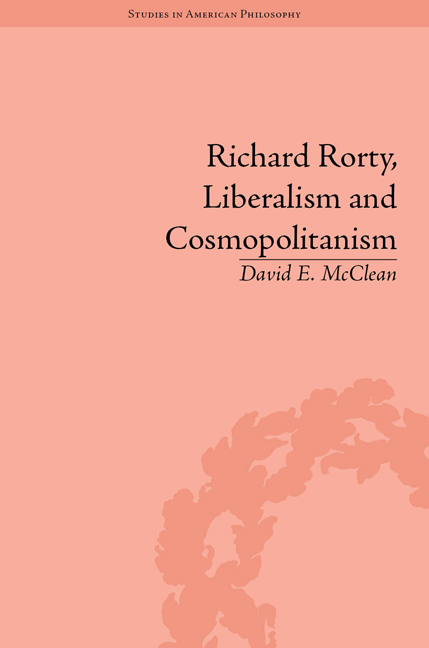Book contents
- Frontmatter
- CONTENTS
- Dedication
- Key to Works by Rorty
- Preface: Rorty's ‘Violence of Direction’
- 1 From Pragmatism to Rortyism
- 2 Alternative Utopias
- 3 Why Rorty Matters
- 4 Rorty on Religion, Race, Culture and Politics
- 5 Rorty and Cosmopolitanism
- Epilogue: Looking Forward to the Year 2096 with Cosmopolitan Hope
- Works Cited
- Notes
- Index
Epilogue: Looking Forward to the Year 2096 with Cosmopolitan Hope
- Frontmatter
- CONTENTS
- Dedication
- Key to Works by Rorty
- Preface: Rorty's ‘Violence of Direction’
- 1 From Pragmatism to Rortyism
- 2 Alternative Utopias
- 3 Why Rorty Matters
- 4 Rorty on Religion, Race, Culture and Politics
- 5 Rorty and Cosmopolitanism
- Epilogue: Looking Forward to the Year 2096 with Cosmopolitan Hope
- Works Cited
- Notes
- Index
Summary
Homo sapiens – the binomial nomenclature for modern humans – will either prove to be an appropriate moniker for our species, or it will prove to be a striking indication of our self-absorption and arrogance, of our fatefully misguided self-assessment (aggravated by the repetition of the second word in the modified scientific nomenclature, i.e. Homo sapiens sapiens). Human beings are facing dangers on many fronts, many of which we ourselves have created. If we are truly wise, we will awaken to the very real possibility that primitive politics and superficial notions of progress will eventually lead to destruction and death on a larger scale than ever seen, just as our superficial notions of ‘improvement’ and ‘progress’ will continue our slide into commercialism and consumerism such that the measure of the worth of our lives will not be ‘seasons of love’, as in the song from a popular musical, but the quantity and monetary value of our accumulations. I have faith that things will not turn out this way, but these will be the outcomes unless we take the lessons of the last one hundred years seriously, as well as take note of the daunting prospects before us – prospects of displaced coastal populations, increasingly kinetic weather events, widespread famines, the depletion of traditional energy resources and overpopulation.
Jonathan Schell's recent death motivated many to dust off their copies of his book The Fate of the Earth.
- Type
- Chapter
- Information
- Richard Rorty, Liberalism and Cosmopolitanism , pp. 175 - 182Publisher: Pickering & ChattoFirst published in: 2014



